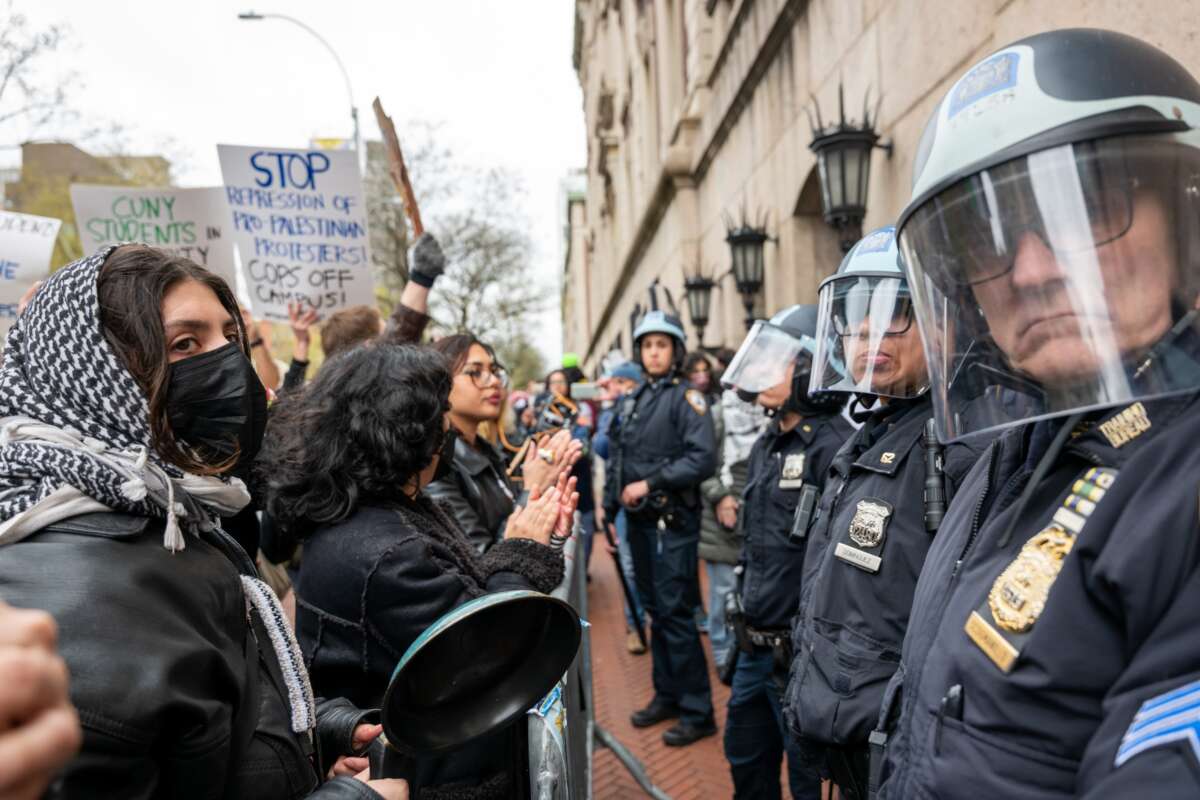Isra Hirsi, pro-Palestine activist and daughter of Rep. Ilhan Omar (D-Minnesota), announced on Thursday that she was one of a handful of activists who have been suspended from Barnard College, a partner college of Columbia University, amid a mass student protest over Columbia and Barnard’s investments in companies that support Israel and its genocide of Gaza.
“I’m an organizer with CU Apartheid Divest [with Columbia Students for Justice in Palestine], in my 3 years at [Barnard] I have never been reprimanded or received any disciplinary warnings. I just received notice that I am 1 of 3 students suspended for standing in solidarity with Palestinians facing a genocide,” Hirsi wrote on social media on Thursday morning.
Hirsi’s suspension came as Columbia and Barnard and the New York City Police Department (NYPD), at the behest of university administrators, began cracking down more severely on university students’ protests.
Though no other suspensions have been formally announced as of Thursday afternoon by the protesters, Columbia President Minouche Shafik has said that “all University students participating in the encampment have been informed they are suspended” in her letter authorizing the NYPD to crack down on the protest, per The Intercept’s Prem Thakker.
It’s unclear how closely the school has monitored the identities of the students in the encampment, but the crowd of protesters at some points numbered in the thousands, some observers said. Hirsi and other Barnard students’ suspensions appeared to be separate from the sweeping order from Shafik, and Hirsi told The Intercept that Omar’s line of questioning on Wednesday, as well as Hirsi’s strong presence in the movement, was “a pressure” for the university.
On Wednesday, students had set up what they deemed a Gaza Solidarity Encampment on Columbia’s main quad, erecting tents and vowing to stay until Columbia divests from all corporations financially profiting from Israel’s genocide and occupation of Palestine.
The protest was modeled after demonstrations during the Vietnam War era in which student protesters set up a “liberated zone” that similarly demanded divestment from a think tank supporting the slaughter in Vietnam.
Mid-day on Thursday, the university began sending in police to arrest students in the camp, arresting dozens after having spent much of Wednesday threatening students with punishments like suspension or arrest and having arrested at least one person supporting the protest outside of campus. Hundreds, if not thousands, of protesters and students showed up on and off campus on Wednesday to join the movement.
“Those of us in Gaza Solidarity Encampment will not be intimidated. We will stand resolute until our demands are met,” said Hirsi.
Due to the suspension, Hirsi and classmates Maryam Iqbal and Soph Dinu are not only going to lose access to their schooling, but are also being evicted, and will lose access to food and health services, according to a press release from Columbia University Apartheid Divest and posted online by journalist Talia Jane. The three suspended students were all also victims of the chemical attack on pro-Palestine protesters that students say was done by assailants with ties to the Israel Defense Forces.
Students had timed the beginning of the encampment for the same day that Shafik was slated to testify before the House in a hearing, perhaps ironically, set by Republicans for Shafik to address supposed “rampant antisemitism” on campus — referring, in large part, to the pro-Palestinian protests that Shafik and her administration have been working vehemently to suppress, sometimes at the cost of the university’s students’ safety.
During that testimony, Omar had grilled Shafik about her characterization of pro-Palestine protests and the use of phrases like “from the river to the sea, Palestine will be free” as antisemitic, pushing Shafik to admit that pro-Palestine protests aren’t about being anti-Jewish, but rather about the liberation of the Palestinian people.
“Have you seen anti-Muslim protests on campus?” Omar asked. “Have you seen one against Arabs? Have you seen one against Palestinians?”
“No, I have not,” Shafik answered.
“Have you seen one against Jewish people? Have you seen a protest saying ‘we are against Jewish people’?” Omar responded.
“No,” Shafik said.
Omar went on to question Shafik over the university’s previous suspension of six students who participated in a protest with Students for Justice in Palestine and allegations that one of the university’s professors, Shai Davidai, had been harassing students over their support of Palestinian rights. Shafik clarified that the university was investigating Davidai over dozens of complaints the university had gotten and that the assailants in the chemical attack had been suspended.
Our most important fundraising appeal of the year
December is the most critical time of year for Truthout, because our nonprofit news is funded almost entirely by individual donations from readers like you. So before you navigate away, we ask that you take just a second to support Truthout with a tax-deductible donation.
This year is a little different. We are up against a far-reaching, wide-scale attack on press freedom coming from the Trump administration. 2025 was a year of frightening censorship, news industry corporate consolidation, and worsening financial conditions for progressive nonprofits across the board.
We can only resist Trump’s agenda by cultivating a strong base of support. The right-wing mediasphere is funded comfortably by billionaire owners and venture capitalist philanthropists. At Truthout, we have you.
We’ve set an ambitious target for our year-end campaign — a goal of $250,000 to keep up our fight against authoritarianism in 2026. Please take a meaningful action in this fight: make a one-time or monthly donation to Truthout before December 31. If you have the means, please dig deep.
